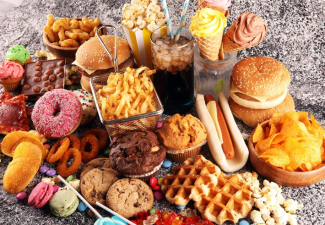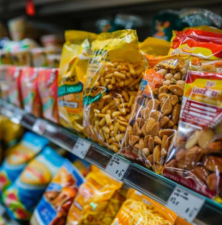Ultra-processed food refers to food that has been deeply processed and has poor nutritional quality because it is high in salt, trans and saturated fats, sugar, calories, etc., and low in protein, micronutrients and fiber.

How to identify ultra-processed food?
According to the NOVA system developed by the food industry, it is classified according to the degree of processing
Level 1:
Minimally processed foods (such as most cooking ingredients that can be bought in the market. The physical and chemical properties of the ingredients themselves are almost unchanged and can be used directly for cooking, such as fruits, vegetables, milk, fish, beans, eggs, nuts and seeds, etc.)
Level 2:
Processed cooking seasonings (seasonings extracted from natural ingredients, such as sugar, oil, soy sauce, vinegar, etc.)
Level 3:
Processed food (a combination of ingredients + seasonings, processed in a relatively direct way. Although it has undergone a certain degree of processing, the physical and chemical properties of the ingredients have not changed. There are big changes, such as pickling, fermentation, baked goods, jams, etc. made at home)
Level 4:
Ultra-processed food (most of them come from factories, and you can't make them at home as they are, and the degree of processing is also very deep, such as packaged snacks and fast food on the market, and such foods often add many additives and ingredients that are not usually used in home cooking, such as preservatives, emulsifiers, sweeteners, artificial colors and flavors, etc., and such foods usually have a longer shelf life)
Ultra-processed food, from raw materials to ultra-processing, most of the ingredients have undergone chemical modification, and the ingredients themselves have been separated and reorganized, and the raw materials are almost invisible. Most packaged snacks and fast foods sold in supermarkets are considered ultra-processed foods, such as potato chips, biscuits, carbonated drinks, instant milk tea, chocolate pies, etc.
Eating a lot of ultra-processed foods will increase the risk of:
- High blood pressure
- Cardiovascular disease
- Heart disease and stroke
How to choose food in the supermarket?
When buying food in the supermarket, be sure to read the food label and be wary of large amounts of sugar, salt and fat.
"Organic" and "natural" ≠ no added sugar
Added sugar refers to all sugars that are not naturally present in food and are added artificially. Foods with "organic" or "natural" labels do not mean that there is no added sugar.
Looking at the carbohydrate content of food labels, you will find that some foods themselves contain a lot of sugar, such as yogurt. In addition, hidden sugars can also be found in the first two or three ingredients in the food ingredient list, including table sugar, maltose, brown sugar, corn syrup, sucrose, honey, concentrated fruit juice, etc.
Tip: We can read food labels carefully to find foods with higher protein and fiber content and less saturated fat and sugar.

Choose a short ingredient list
Generally speaking, the shorter the ingredient list, the less processed it is. For example, no more than 5 ingredients.
The possible cause of premature death from ultra-processed foods may be that ultra-processed foods usually contain a lot of food additives, such as titanium dioxide, which has been found to be associated with chronic enteritis and cancer. Emulsifiers and artificial sweeteners may damage intestinal flora and are associated with inflammation, metabolic syndrome, type 2 diabetes and cancer. BPA in food packaging is also a risk factor.
When shopping in the supermarket, be sure to read the food labels and ingredient lists carefully to avoid consuming too much sugar, sodium and fat.
